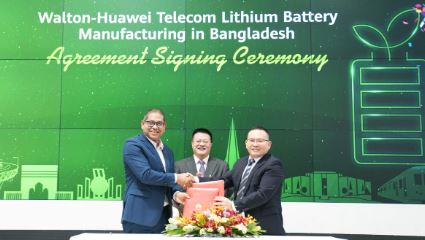
DHAKA, Sept 12, 2024 (BSS) - Local tech conglomerate Walton has joined hands with Chinese giant Huawei to produce lithium battery locally which will not only enable the country's telco operators to save cost but also help Bangladesh to meet the global carbon emissions reduction target.
To this end, Walton struck a deal with Huawei which would empower the company to build an advanced and full-automated production line with 80,000 pieces annual yearly capacity, alongside managing sales and after-sales services nationwide, said a press release today.
The release said that Huawei Bangladesh Chief Executive Officer Pan Junfeng and S M Rezaul Alam, Chairman, Walton Digi-Tech Industries Limited put pen on the agreement paper at Huawei Bangladesh Academy.
Chinese Ambassador to Bangladesh Yao Wen graced the ceremony as the chief guest where representatives of Grameenphone along with around 30 carriers were also present.
The country's mobile telecom's BTS (Base Transceiver Station) are fully dependent on batteries for their power back up and now lion parts of these batteries are being imported.
Under this agreement, Walton will manufacture telecommunication lithium batteries in Bangladesh and eye to launch the product in the market within the next seven months.
Huawei will provide technical support, design expertise, raw materials, and guidance for manufacturing these lithium batteries.
For years, BTS towers have relied on lead-acid batteries as a backup power source. However, these batteries are not environment-friendly, unlike their lithium-ion counterparts.
Lead batteries produce 50 percent more CO2 emissions than lithium-ion batteries, which also contribute more to the air and soil pollution.
Lead-acid batteries are also less efficient, with only 80-85 percent battery efficiency, shorter lifespan, and low battery energy density. It also requires more installation space and frequent maintenance.
In contrast, lithium-ion batteries boast nearly 100 percent efficiency, longer life-spans, and require less maintenance.
They are also more environmentally friendly when it comes to recycling. Thus, lithium batteries as BTS tower power backup have become a consensus in the industry. In the market of Bangladesh, low-quality non-intelligent lithium batteries are still widely used.
Non-intelligent lithium batteries have a short lifespan, require frequent site maintenance, and cannot be managed by the NMS (Network Management System).
S M Monjurul Alam Ovee, Managing Director, Walton Digi-Tech Industries, said, "Our latest initiative-the establishment of a state-of-the-art lithium battery manufacturing plant will ease the dependency on the current lead acid batteries for telecom industry in Bangladesh which will significantly improve the overall carbon emission."
Mentioning that this project is more than just a business endeavor, he said "Our mission has always been to make life better for the people of Bangladesh, and this agreement is another leap towards that goal."
Huawei CEO Pan Junfeng said that Huawei's lithium batteries serve more than 340 operators in over 170 countries, making up one-third of the global telecom energy field.
"I'm confident that our collaboration will drive innovation, create opportunities, and set a high standard for success," he added.